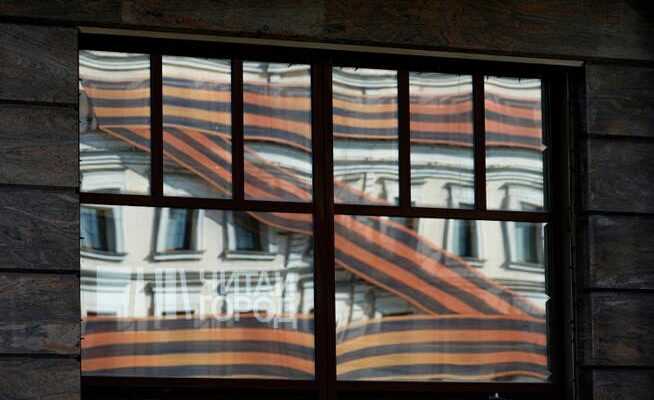In view of the Ukraine war, the situation of intellectuals in Russia is more tense than it has been since 1918. There are those who take part, those who remain silent and those who protest, many of whom have already left the country. And the question of guilt and responsibility arises.
Z like “Who knows what it means”. – Reflection in Moscow.
The big philosophical questions of Russian culture, “Who is to blame?” and “What to do?” must be answered again today. The clarification of the question of guilt should be left to the International Court of Justice in The Hague. But the second question is of the utmost urgency for intellectuals in Russia.
According to polls, the majority of the Russian population supports the war in Ukraine. The approval comes as no surprise as society has been preparing for this war for some time. Many Russians live in virtual reality and view this war as a TV show. Advertising posters with the slogans “For our people” or “We will not let our people down” characterize the image of numerous cities. Everywhere you see the letter Z, which has become the ominous symbol of patriotic awakening. How do Russian intellectuals behave in this spooky atmosphere?
«Unpredictable moral catastrophe»
On March 8, 2022, the Anglicist Nikolai Epple questioned the responsibility of intellectuals for the war on his Telegram channel: “Russia is currently experiencing a moral catastrophe, the extent of which cannot yet be foreseen. If this catastrophe can ever be overcome, it will only be by accepting the criminal, moral, political and metaphysical responsibility for what happened.” From his point of view, all Russian culture carriers must answer Hannah Arendt’s question: “How can it be that what happened was also possible through us?” Only then can the existence of the Russian nation and Russian culture be secured for the future. With the phrase “through us”, Epple deliberately refers to the Stuttgart acknowledgment of guilt from 1945.
On March 16, journalist Ilya Krasilshchik published an article in the New York Times programmatically entitled “Russians must accept the truth. We failed.” In this very personal essay, he calls on his fellow citizens to take responsibility for the aggressive war in Ukraine.
His article made waves in the Russian media and triggered a shitstorm on social media. The author was accused of speaking only for himself and not for all Russians. He was also accused of spreading anti-Russian rhetoric. “There is nothing bad in love for the nation” or “I’m proud of my nation” were frequent comments on his Instagram post.
Krasilschtschik then explained on Instagram that he did not want to offend anyone with his article. He now publishes evidence of the humanitarian catastrophe in Ukraine, including in Bucha and Mariupol, as well as interviews with Ukrainian witnesses and refugees on his channel. The Russian judiciary has since accused the author of spreading misinformation about the Russian armed forces.
The sociologist Grigory Yudin had already protested against the Russian invasion of Ukraine on February 24. He was brutally beaten by the police at the time. In an interview with Deutsche Welle on March 8, 2022, he said: “The most important thing we have to learn is to take responsibility for what we do.” Russia needs comprehensive political reform.
In April 2022, the cultural scientist Ilya Kukulin published his essay “From the Diary. On the margins of Bertolt Brecht’s ‹Refugee Talks›».
Overdue coming to terms with the past
Kukulin argues that it is counterproductive to place collective guilt on the entire Russian population – as was done in Germany after World War II. Instead, he advocates a dialogue with everyone, including those who don’t feel guilty about the crime in Ukraine. He calls for a new Russian culture based not on dominance and discrimination, but on a peaceful community. “Those who are going to build Russian post-war culture – after the war and after the moral defeats suffered by both the Russian regime and the Russian intellectual community – will have to be very careful not to whitewash Russian culture.” But this work must begin immediately.
To this day, the trauma of recent history in Russia has not been dealt with. In the 1990s, the Soviet crimes and the Stalinist terror could be named. In the Putin era, however, such attempts faded behind the glorification of the Great Patriotic War. There is no Russian coming to terms with the past, but many intellectuals are demanding it. That is why Nikolai Epple’s book “Uncomfortable Past. The memory of state crimes in Russia and other countries» has attracted attention and needs to be reprinted.
The situation of intellectuals in Russia is tense. The division in society is reminiscent of 1918. There are three camps: some sing the praises of the Kremlin, many carefully keep their distance from the war, and finally a few actively protest against the war – knowing full well that they are risking everything in the process. The list of “foreign agents” is updated weekly with new names. These include prominent voices such as the political scientist Ekaterina Schulmann or the video blogger Yuri Dud. The Russian Ministry of Justice currently classifies 142 private individuals as “foreign agents”. These intellectuals know what to do – but they first have to assert themselves against the violent state.
